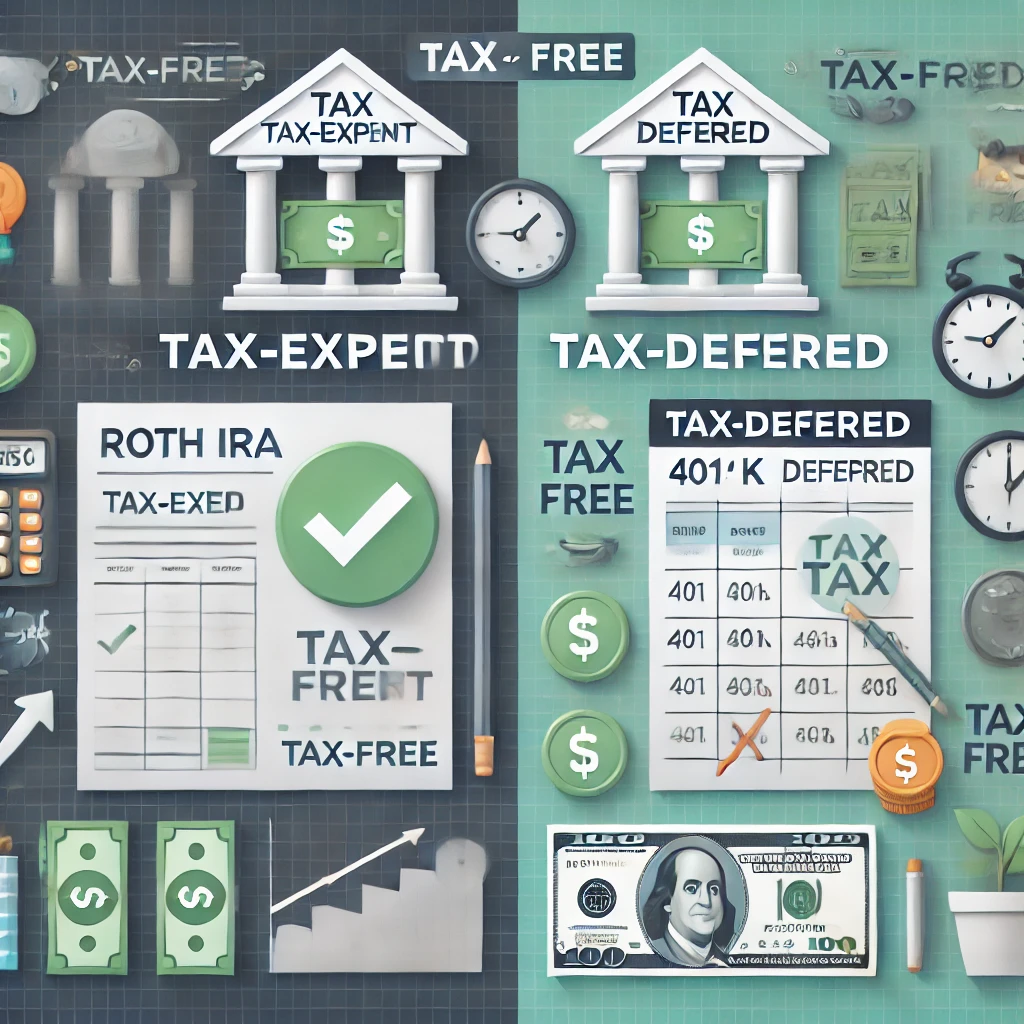When it comes to saving for retirement, it can feel like navigating a maze of financial jargon. You might have heard terms like tax-deferred and tax-exempt, but what do they really mean? More importantly, how do they affect your hard-earned money? Don’t worry, I’ve got you covered. Let’s break down these two types of retirement accounts in simple terms, so you can make informed decisions.

Tax-Deferred Accounts: Save Now, Pay Later
First up, tax-deferred accounts. These are like hitting the snooze button on your taxes—you get to put off paying them until a later date. The main benefit? You lower your taxable income now. When you contribute to a tax-deferred retirement account, like a traditional 401(k) or a traditional IRA, your money goes in before taxes. This can reduce your taxable income for the year, which means potentially paying less in taxes today.
The catch? You’ll eventually pay taxes when you withdraw the money during retirement. While you might be in a lower tax bracket (especially if your income drops), there’s no guarantee. The key idea is that tax-deferred accounts let your investments grow without the drag of taxes along the way, helping you potentially accumulate more wealth over time.
Quick Example: Contribute $5,000 to a tax-deferred 401(k) in a year when your income is $50,000. Your taxable income now drops to $45,000, saving you money on this year’s tax bill. But when you withdraw that $5,000 (plus any earnings) in retirement, you’ll pay taxes on it as regular income.
Tax-Exempt Accounts: Pay Now, Save Later
Now let’s talk tax-exempt accounts, like Roth IRAs or Roth 401(k)s. With these, you pay taxes upfront on the money you contribute. The big perk is what comes later: when you start taking withdrawals in retirement, both your original contributions and any earnings come out tax-free. Yep, you heard that right—no taxes on your withdrawals. It’s like the future you is getting a gift.
This can be a huge advantage if you expect your tax rate to be higher during retirement or if you want to avoid surprises down the line. Plus, having tax-free income in retirement can help you manage your overall tax liability better, giving you more control over how much you pay Uncle Sam each year.
Quick Example: Say you put $5,000 into a Roth IRA when you earn $50,000. You still pay taxes on the full $50,000, but when you withdraw that $5,000 (and any earnings it’s made) in retirement, it’s all yours—tax-free.
So, Which One Is Better?
It all depends on your current situation and where you see yourself in the future. If you’re early in your career or expect to be in a higher tax bracket down the road, a tax-exempt (Roth) account might make sense. Paying taxes now at a lower rate could save you more later when you’re withdrawing funds tax-free.
On the other hand, if you’re currently in a high tax bracket and expect a lower tax rate in retirement, a tax-deferred account could be a better bet. You’ll enjoy the tax break now and (hopefully) pay less when you start withdrawing.
How to Use Both for a Balanced Approach
Who says you have to choose just one? Many financial experts recommend a blend of both tax-deferred and tax-exempt accounts. This strategy gives you tax flexibility in retirement, allowing you to draw from both taxable and non-taxable sources and better manage your overall tax bill. For a deeper dive into different types of retirement plans and how they might fit into your strategy, the IRS provides a helpful guide on retirement plan types and benefits.
Final Thoughts: Empower Your Financial Future
Now that you know the difference between tax-deferred and tax-exempt accounts, take charge of your financial future with confidence. Start by reviewing your current savings and thinking about where you want to be in retirement. Are you making the most of the options available? Small changes can lead to big results over time.
Remember, saving for retirement doesn’t have to be complicated. Whether you decide to save now and pay later or pay now and save later, the most important thing is getting started. You don’t need a financial professional to take the first step—you’ve got the knowledge and the power to make choices that will benefit you for years to come. Start today, and your future self will thank you!
Disclaimer: this is not legal, tax, accounting, investment nor other professional advice. Consult an advisor and do your own research for your individual situation.